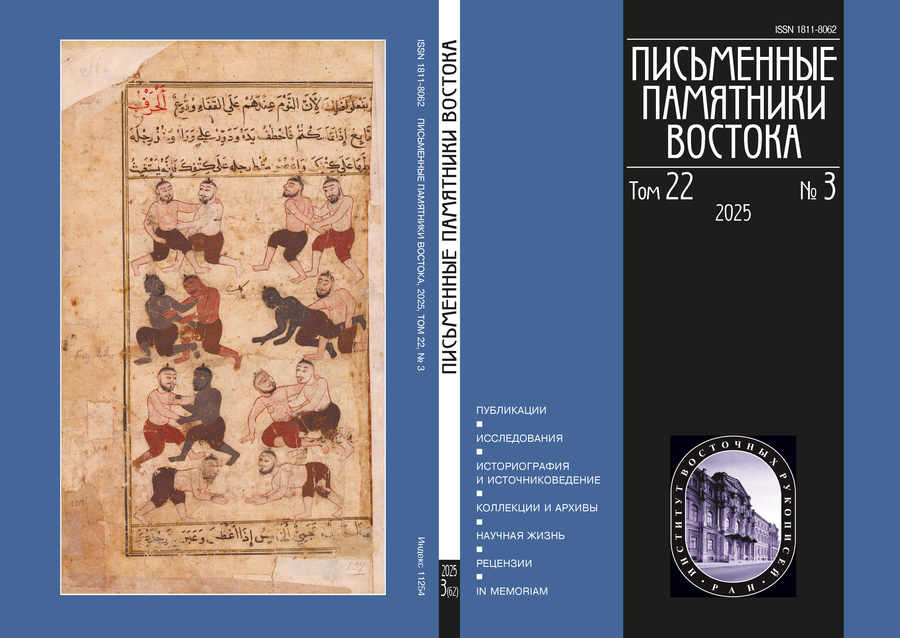Pratyakṣa in Prāsaṅgika: how is sensory perception possible?
- 作者: Burmistrov S.L.1
-
隶属关系:
- Institute of Oriental Manuscripts RAS
- 期: 卷 22, 编号 3 (2025)
- 页面: 27-41
- 栏目: Research works
- ##submission.datePublished##: 30.09.2025
- URL: https://journals.eco-vector.com/1811-8062/article/view/688489
- DOI: https://doi.org/10.55512/WMO688489
- ID: 688489
如何引用文章
全文:
详细
In the Buddhist Mahāyāna school Madhyamaka-Prāsaṅgika, the possibility of sense perception — one of the two (along with logical inference) instruments of cognition recognized in Buddhism — is under question. If all differences are false, being determined by ignorance that obscures saṃsāric consciousness, then perception appears, at first glance, to be impossible, since there is neither a perceiving subject nor a perceived object. Unlike the Yogācārins, the Prāsaṅgikas exclude the possibility of preverbal perception: it is always conceptually laden with the distinction between the subject and the object. However, in fact, perception is impossible only at the level of absolute reality, while at the level of relative reality it exists — but its object is not so much external objects as the fruits of a person’s karmically significant past actions, appearing as “external” objects. Therefore, the theory of perception in Prāsaṅgika must be viewed not through the prism of the correspondence theory, but through that of the coherence or pragmatic theories of truth.
作者简介
Sergei Burmistrov
Institute of Oriental Manuscripts RAS
编辑信件的主要联系方式.
Email: SLBurmistrov@yandex.ru
ORCID iD: 0000-0002-5455-9788
http://www.orientalstudies.ru/eng/index.php?option=com_personalities&Itemid=74&person=671
Dr. Sci. (Philosophy), Leading Researcher, Section of South Asian Studies, Department of Central and South Asian Studies
俄罗斯联邦, St. Petersburg参考
- Abhidharmakośabhāṣyam of Vasubandhu. Ed. by P. Pradhan. 2nd ed. Patna: K.P. Jayaswal Research Center, 1975 (in English).
- Aṅguttara-Nikāya of the Sūtta-Piṭaka. Ed. by E. Morris. Vol. I. London: Pali Text Society, 1885 (in English).
- Arnold, Dan. Buddhists, Brahmins, and Belief: Epistemology in South Asian Philosophy of Religion. New York: Columbia University Press, 2005. DOI: doi.org/10.7312/arno13280 (in English).
- Asanga. Abhidharma-samuccaya. Critically edited and studied by Pralhad Pradhan. Santiniketan: Visva-Bharati, 1950 (in English).
- Bruner, Jerome. Psikhologiia poznaniia: Za predelami neposredstvennoi informatsii [Beyond the Information Given: Studies in the Psychology of Knowing]. Transl. by K.I. Babitsky; ed. by A.R. Luria. Moscow: Progress, 1977 (in Russian).
- Burmistrov, Sergei L. “Evoliutsiia poniatiia pustoty: ot Pāliiskogo Kanona k pozdnei madhyamake” [The Evolution of the Concept of Emptiness: From the Pāli Canon to Late Madhyamaka]. Mongolica, 2022, vol. XXV, no. 2, pp. 35–44. doi: 10.25882/8zqa-7769 (in English).
- Coseru, Christian. “Buddhist ‘Foundationalism’ and the Phenomenology of Perception”. Philosophy East & West, 2009, vol. 59(4), pp. 409–439 (in English).
- Kalupahana, David J. Mūlamadhyamakakārikā of Nāgārjuna: The Philosophy of the Middle Way. Delhi: Motilal Banarsidass, 1999 (in English).
- Fumerton, Richard. “Foundationalist Theories of Epistemic Justification”. In: Stanford Encyclopedia of Philosophy. Ed. by E.N. Zalta. URL: https://plato.stanford.edu/entries/ justep-foundational/ (accessed: 14.01.2025) (in English).
- Lupyan, Gary. “How Reliable Is Perception?” Philosophical Topics, 2017, vol. 45(1), pp. 81–106 (in English).
- Lyssenko, Victoria G. “Svalakṣaṇa — sāmānyalakṣaṇa”. In: Filosofiia buddizma: Entsyklopediia [Philosophy of Buddhism: An Encyclopedia]. Ed. by M.T. Stepaniants. Moscow: Vostochnaya literatura, 2011, pp. 625–627 (in Russian).
- MacDonald, Anne. In Clear Words: The Prasannapadā. Chapter One. 2 vols. Vol. II. Wien: Verlag der Österreichischen Akademie der Wissenschaften, 2015 (in English).
- Nāgārjuna. Mūlamadhyamakakārikās (Mādhyamikasūtras) avec la Prasannapadā commentaire de Candrakīrti. Publié par Louis de la Vallée Poussin. St. Pétersbourg: Académie Impériale des Sciences, 1903 (in French).
- Scherrer-Schaub, Cristina. Yuktiṣaṣṭikāvṛtti: Commentaire à la soixantaine sur le raisonnement ou Du vrai enseignement de la causalité par le Maître indien Candrakīrti. Bruxelles: Institut Belge des hautes études Chinoises, 1991 (in French).
- Schiffman, Harvey R. Oschuschenie i vospriiatie [Sensation and Perception: An Integrated Approach]. Transl. by Z. Zamchuk. St. Petersburg: Piter, 2003 (in Russian).
- Shaoyong Ye. “From Scepticism to Nihilism: A Nihilistic Interpretation of Nāgārjuna’s Refutations”. Journal of Indian Philosophy, 2019, vol. 47, pp. 749–777. DOI: doi.org/10.1007/s10781-019-09410-4 (in English).
- Shokhin, Vladimir K. Brāhmaṇistskaya Filosofia: Nachalnyi i Ranneklassicheskii Periody [Brāhmaṇic Philosophy: Initial and Early Classical Periods]. Moscow: Vostochnaya literatura, 1994 (in English).
- Sinha, Jadunath. Indian Psychology: Perception. London: Kegan Paul, Trench, Trubner & Co., 1934 (in English).
- Stcherbatsky, Theodor I. Teoriia poznaniia i logika po ucheniiu pozdneishikh buddistov [Theory of Knowledge and Logic according to the Teaching of Later Buddhists]. 2 vols. St. Petersburg: Asta-Press, 1995 (in English).
- Tola, Fernando & Dragonetti, Carmen. “The Yuktiṣaṣṭikākārikā of Nāgārjuna”. Journal of the International Association of Buddhist Studies, 1983, vol. 6(2), pp. 94–123 (in English).
- Vasubandhu. Entsiklopediia Abhidharmy (Abhidharmakosha). T. 1: Razdel I: Uchenie o klassakh elementov; Razdel II: Uchenie o faktorakh dominirovaniia v psikhike [The Encyclopedia of Abhidharma (Abhidharmakośa). Vol. 1. Pt. I: The Theory of the Classes of Elements; Pt. II: The Theory of the Factors of Domination in the Mind]. Ed. and transl. by E.P. Ostrovskaia, V.I. Rudoi. Moscow: Ladomir, 1998 (in Russian).
- Vasubandhu. The Encyclopedia of Abhidharma. Vol. 2. Pt. III: The Theory of World; Pt. IV: The Theory of Karma. Ed. and transl. by E.P. Ostrovskaia, V.I. Rudoi. Moscow: Ladomir, 2001 (in Russian).
- Vasubandhu. Entsiklopediia buddiiskoi kanonicheskoi filosofii (Abhidharma) [Encyclopedia of Buddhist Canonical Philosophy (Abhidharma)]. Transl. into Russian, comment. and study by E. Ostrovskaia and V. I. Rudoi. St. Petersburg: St. Petersburg State University Publishery, 2006 (in Russian).
- Westerhoff, Jan. “On the Nihilist Interpretation of Madhyamaka”. Journal of Indian Philosophy, 2016, vol. 44, pp. 337–376. doi: 10.1007/s10781-014-9266-z (in English).
补充文件







